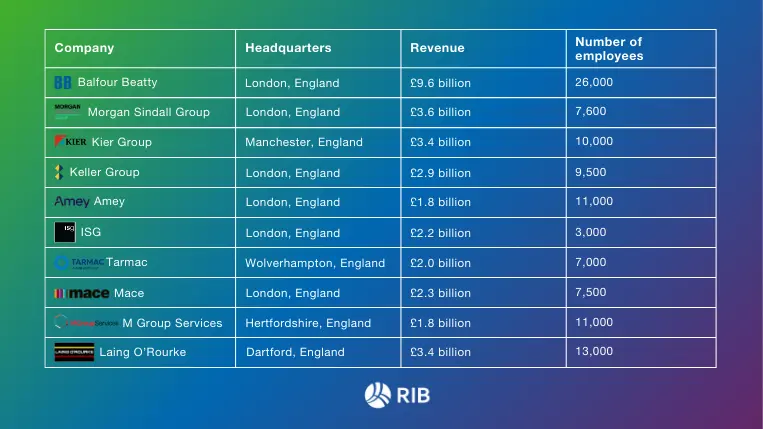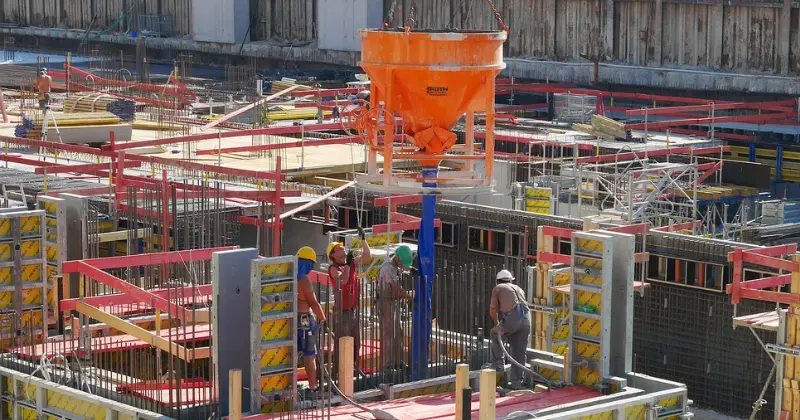11 mins read
Discover the Top 10 Construction Companies in the UK

The UK’s construction industry faces various challenges, including increasing material costs, labor shortages, and uncertain economic environments. These have made it difficult for organizations in the industry to achieve their growth objectives or, for some, even to survive.
To truly understand the industry’s current situation, it is crucial to examine its leading players, understand how each navigates the changing landscape, and capitalize on the different trends and innovations.
To help you with this task, we’ve put together this article, which outlines the top 10 construction companies in the UK and provides a brief overview of the current state of the market.
Let’s dive in!
Exploring the Current State of the Construction Industry in the UK
The construction industry is one of the most significant sectors in the UK, employing more than 2 million people and contributing over 100 billion to the economy.
In 2021, after the COVID-19 pandemic, the construction industry saw a positive growth rate, with a recorded 12.6 percent increase in construction output. However, in 2023, the situation changed, with the percentage decreasing to 2.1, which also showed a positive growth rate but less than in the previous years after the pandemic.
Still, experts suggest that the construction industry in the UK is expected to grow from USD 398.69 billion (GBP 307.16 billion) in 2024 to USD 466.57 billion (GBP 359.47 billion) by 2029. The main drivers for growth are the growing importance of modern and smart buildings across Europe, the need for sustainable construction, and an increasing demand for housing in urban areas, among other things
Using digital technology in construction projects, including Building Information Modeling (BIM), drones, 3D printing, and the Internet of Things (IoT) applications, can present significant competitive advantages for businesses looking to improve their planning, communication, and overall efficiency.
Top Construction Companies UK

With around 100.000 construction companies in the UK, picking the top 10 is not easy. For this blog post, we took the top 10 companies listed in The Construction Index’s insightful report “Top 100 Construction Companies”, where companies are categorized based on their revenue, turnover, profit, and other factors.
Balfour Beatty
Balfour Beatty was founded in 1909 in London by George Balfour and Andrew Beatty. The company’s first contract, running tramlines in Luton and Dartford, was awarded that same year, paving the way for more than a century of success to come.
Over the 110 years since its inception, Balfour Beatty has become one of the biggest construction companies in the UK, with over 12.000 employees in the region. The company also operates in over 80 countries around the world with significant infrastructure projects like the construction of the Mina Jebel Ali Port in Dubai, the design and construction of the 1,000MW low-emission Barking Power Station in the UK, and the expansion of Terminal 2 at Hong Kong International Airport, among many others.
Since 2020, and due to its increasing carbon footprint, the company has started focusing more on sustainability, launching strategies that aim to protect the environment while leaving a positive social legacy. The main focus areas include mitigating climate change, being nature-positive, ensuring resource efficiency, and creating a diverse and inclusive organization, among others.
Morgan Sindall Group
The Morgan Sindall Group is a leading Construction and Regeneration company that has operated in public, commercial, and regulated spaces in the UK since the 1970s. It employs more than 6,700 people through six divisions: Construction & Infrastructure, Fit-Out, Property Services, Partnership Housing, Urban Regeneration, and Investments.
Over the years, the Morgan Sindall Group has been a part of significant projects, including the Murray Royal Hospital in Perth (2012), the expansion of Whitechapel station for Crossrail (2021), and the construction of six new stations on the Northumberland Line (2024), among many others.
In the past years, the company has expanded its portfolio into new markets and is currently increasing its focus on sustainability by integrating green practices into its projects to reduce carbon emissions and improve energy efficiency.
Kier Group
Moving on with our list of the largest construction companies in the UK, we have Kier Group. Founded in 1928 in Staffordshire, England, the company has become one of the leading providers of infrastructure projects in the UK, employing more than 10,000 people across its four divisions: transportation, natural resources, construction, and property.
Across its almost 100-year trajectory, the company has completed major infrastructure projects, including the North Terminal at Gatwick Airport (1993), the Hairmyres Hospital (2001), and the UK Supreme Court in London (2009). It has most recently been involved in the HS2 project, a high-way speed railway that will run between Handsacre and London, which will be completed in 2031.
As of 2023, the company had more than 400 live projects across the UK, helped keep the power of 10 million homes, and maintained more than 21,000km of roads across the region—all with sustainability at the heart of their mission.
Keller Group
Keller Group is next on our list of construction companies in the UK and the largest geotechnical specialist contractor in the UK and the world. Established in 1860, the company employs around 10,000 people across 40 countries, where it offers services related to ground improvement, grouting, deep foundations, industrial services, earth retention, post-tension systems, and instrumentation and monitoring, among others.
Leveraging their almost two centuries of experience, Keller Group has been involved in major projects, including the London Power Tunnels 2, the First Street Tunnel in Washington DC, the reconstruction of the Tampa International Airport Bridge, and the Thames Tideway in London, among many others that can be found on the company’s website.
The company focuses on sustainable markets, generating sustained value for its clients with geotechnical solutions that reduce material usage, carbon emissions, costs, and time, making Keller Group a leading contractor for all types of structures.
Amey
As stated on its website, Amey is a “leading provider of full life-cycle engineering, operations, and decarbonization solutions for transport infrastructure and facilities.” Founded in 1921 by William Charles Amey, the company has over a century of experience making the UK’s infrastructure more efficient and sustainable by combining specialist skills with data, analytics, and innovative technologies to deliver long-lasting solutions.
The company operates in various markets, including roads, rail, the public sector, justice, education, healthcare, aviation, and more, and it has been a part of important infrastructure projects, such as The Thames Tideway Tunnel, the Transpennine Route Upgrade (TRU) between Manchester and Leeds, and the Asset Management System for Heathrow Airport, among many others.
In the past years, Amey has positioned sustainability and innovation at the forefront of their strategies, developing solutions to reduce carbon emissions and promote sustainable design practices, delivering value throughout the entire lifecycle of a project.
ISG
NOTE: Eight companies in the ISG group (the ISG Companies) entered administration on 20 September 2024.
Next, in the top UK construction companies list, we have ISG, a London-based, privately-owned company that offers construction services in Europe, the Middle East, and Asia. Over the more than three decades since it was founded in 1989, ISG has had a mission of delivering more than just buildings but places where people can make memories and businesses can thrive.
The company offers services related to construction, fit-out, and hyperscale, participating in several iconic projects, including the renovation of the Royal Festival Hall in London (2007), the fit-out of ST Pancras International Railway station in London (2008), the Royal Mint visitor center in Llantrisant (2016), and the New facility for UCL Queen Square Institute of Neurology and Institute of Dementia Research to be finalized this year, among many others.
ISG has tried to differentiate itself from other companies by investing in innovative technology like virtual reality to show clients what their spaces will look like and other technologies to build smarter and more environmentally friendly buildings.
Tarmac
Founded in 1903, Tarmac is a renewed company that produces and supplies construction materials like granite, asphalt, concrete, gravel, aggregates, and more. Over the years, the company has gone through various mergers and acquisitions, with the most important ones being the merger with Lafarge in 2012, rebranding as Lafarge Tarmac, and in 2015 when CRH acquired the joined venture and renamed it Tarmac for its UK operations. Today, Tarmac operates as a CRH company with 7,000 employees across 350 sites in the United Kingdom.
Over more than a century of trajectory, Tarmac has been a leading provider of construction materials and solutions, contributing to some of the UK’s most iconic projects, including the Birmingham Library, the restoration of St Paul’s Cathedral, Wembley Stadium, Glasgow Airport, Heathrow Terminal 5, and much more.
Mace
Mace Group is a London-based global consultancy and construction company operating across five continents with 7,300 employees. Over its more than 30 years of experience in the construction field, the company has prioritized efficiency and innovation, leveraging expertise and technology to deliver projects faster, safer, and better than the traditional way.
The company operates in various sectors, including hospitality and sports, commercial, defense and security, energy and utilities, education, housing, healthcare, transport, retail, healthcare, and more, making its diverse experience one of its most significant competitive advantages.
Mace Group offers consulting services in areas like project management, cost consultancy, BIM, architecture, and more, and construction services, making them part of iconic projects like the London Eye (2000), The Shard at London Bridge (2012), the Tottenham Stadium (2019), and the NHS Nightingale Hospital in London (2020), among others.
M Group Services
Place nine in our list of “UK largest construction companies” is M Group Services. The company delivers essential infrastructure services in the telecommunications, water, energy, and transport sectors across the United Kingdom and Ireland, focusing on safety, operational efficiency, and customer service.
M Group Services was recently founded in 2016 intending to unite 16 businesses under the same brand umbrella, with the oldest operating since 1884. Since its establishment, the company has been a part of major construction projects in the UK and Ireland, employing over 10,000 people.
The company’s recent projects include the upgrade of water and gas networks, roadworks, and environmental initiatives, including the Thames Water AMP7 Programme, the HS2 project, and the maintenance of Highways England roads, among others.
Laing O’Rourke
Last but not least, in our list of construction companies UK, we have Laing O’Rourke, a multinational construction and engineering company founded in 1978. The company, which is the largest privately owned construction company in the UK, has technology at the forefront of its operations, using innovations like digital engineering and AI to produce powerful results for its clients.
Laing O’Rourke has participated in projects in various industries, including education and science, defense, healthcare, leisure, and more. Amongst its most highlighted projects are Heathrow Terminal 5 in London, the Northern Centre for Cancer Treatment in Newcastle, the redevelopment of Bond Street Station, and the Everton F.C. new stadium, which is due to be completed this year.
What Can Construction Management Software Do for Companies in the UK?
The companies listed above have benefited from decades to centuries of success in the UK’s building industry. This is due to their experience and expertise, but also the support of the right technology. In an industry continuously evolving and becoming increasingly competitive, technology can provide a huge advantage for organizations looking to eliminate some of the industry’s common hurdles. State-of-the-art construction management solutions like RIB Software can work as excellent partners to help these organizations thrive with the help of digital construction technology.
Better project management: Having all project data, processes, and people united in a single construction management software gives companies a holistic view of the project to make better-informed decisions regarding planning, budgeting and scheduling. This ensures every detail is handled properly, increasing productivity and profitability.
Enhanced cost control: With so many moving parts and changes happening all the time, maintaining efficient budgeting and cost control in construction projects takes work. Professional cost estimation and planning software like RIB Candy provides companies with the necessary tools to generate accurate estimates, helping to avoid errors that can cost the project time and money.
Increased communication and collaboration: As you learned in this post, effective communication and collaboration are crucial to success in the construction sector. Professional construction collaboration software offers the perfect environment for stakeholders to stay up-to-date about the project’s latest developments and collaborate to increase efficiency and productivity.
Improved quality and risk management: Specialized construction software is developed by experts with decades of experience in the building industry. These solutions help ensure all quality aspects are covered by tracking compliance with industry standards and regulations and internal requirements set by the client.
Enhanced data analysis and reporting: Intuition can no longer be the primary driver of decisions in the building industry, especially when dealing with infrastructure that people will populate. Professional construction analytics software provides real-time data about a project to ensure facts back all decisions and the end product meets the expected quality, budget, and timeline. Having real-time insights at your fingertips also allows companies to spot any issues and tackle them before they can affect the project, making all workflows much more efficient than before.
Conclusion
As we can see from ISG’s recent financial woes, no company is bulletproof. There are always factors outside of your control, exacerbated by profit margins that run as low as around 2%. However, technology can become a powerful ally in reducing risk, optimizing resources and making projects more efficient and successful at a lower cost.
The construction industry in the UK has not been free of challenges after the pandemic and the current global environment. Companies that want to thrive in the current climate need to find ways to innovate and make the most out of their resources. In that sense, technology can become a powerful ally to optimize resources and make projects more efficient and successful at a lower cost.
At RIB Software, we are a leading provider of construction software solutions with decades of experience helping companies in the building sector boost their projects. If you want to test our state-of-the-art solutions and benefit from enhanced planning, collaboration, and productivity, get a free demo of RIB’s toolkit today!
Most Recent
11 mins read
10 mins read
10 mins read
29 mins read
Blog Categories

Ebook











